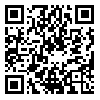Volume 21, Issue 4 (December 2023)
Iranian Rehabilitation Journal 2023, 21(4): 611-622 |
Back to browse issues page
Ethics code: IR-.ARUMS.REC.1399.045
Download citation:
BibTeX | RIS | EndNote | Medlars | ProCite | Reference Manager | RefWorks
Send citation to:



BibTeX | RIS | EndNote | Medlars | ProCite | Reference Manager | RefWorks
Send citation to:
Ahmadboukani S, Fathi D, Bashirgonbadi S, Raisi L, Derakhshan M, Molaei B. The Relationship Between Health Literacy, Perceived Stress, Anxiety Sensitivity, and Self-care for COVID-19: The Mediating Role of Health Locus of Control. Iranian Rehabilitation Journal 2023; 21 (4) :611-622
URL: http://irj.uswr.ac.ir/article-1-1783-en.html
URL: http://irj.uswr.ac.ir/article-1-1783-en.html
Soliman Ahmadboukani1 

 , Davod Fathi1
, Davod Fathi1 

 , Sepideh Bashirgonbadi1
, Sepideh Bashirgonbadi1 

 , Leila Raisi2
, Leila Raisi2 

 , Meraj Derakhshan3
, Meraj Derakhshan3 

 , Behnam Molaei *4
, Behnam Molaei *4 




 , Davod Fathi1
, Davod Fathi1 

 , Sepideh Bashirgonbadi1
, Sepideh Bashirgonbadi1 

 , Leila Raisi2
, Leila Raisi2 

 , Meraj Derakhshan3
, Meraj Derakhshan3 

 , Behnam Molaei *4
, Behnam Molaei *4 


1- Department of Counseling, Faculty of Educational Sciences and Psychology, University of Mohaghegh Ardabili, Ardabil, Iran.
2- Department of Midwifery, School of Nursing and Midwifery, Ardabil University of Medical Sciences, Ardabil, Iran.
3- Department of Counseling, Bushehr Farhangian University, Bushehr, Iran.
4- Department of Psychiatry, Faculty of Medicine, Ardabil University of Medical Science, Ardabil, Iran.
2- Department of Midwifery, School of Nursing and Midwifery, Ardabil University of Medical Sciences, Ardabil, Iran.
3- Department of Counseling, Bushehr Farhangian University, Bushehr, Iran.
4- Department of Psychiatry, Faculty of Medicine, Ardabil University of Medical Science, Ardabil, Iran.
Abstract: (3411 Views)
Objectives: This study aims to determine whether health literacy, perceived stress, and anxiety sensitivity are correlated with self-care for COVID-19, focusing on the mediating role of health locus of control (HLOC) in Ardabil City, in northwestern Iran, in 2020.
Methods: This descriptive-correlational study was conducted using path analysis. The research population included households living in Ardabil city. The participants included 300 persons who were selected using the convenience sampling method. The data were collected via the health literacy instrument for Iranian adults (HELIA), perceived stress scale (PSS), anxiety sensitivity scale (ASS), self-care questionnaire, and locus of control scale (LCS). The statistical analysis of the collected data was performed with SPSS software, version 25 and AMOS software, version 24.
Results: Data analysis showed that anxiety sensitivity had a negative relationship with the internal locus of control (ILOC) and a positive and significant relationship with the external locus of control (ELOC). Furthermore, health literacy has a positive correlation with ILOC and a negative and significant correlation with ELOC. The results also demonstrated that perceived stress had a direct and negative impact on ELOC and a direct and positive impact on the chance locus of control. Moreover, ILOC had a positive and direct relationship with self-care for COVID-19, and ELOC and chance locus of control had a negative and direct relationship. The data also indicated that HLOC played a fully mediating role in the relationships between the research variables, and health literacy and anxiety sensitivity were associated with self-care for COVID-19 mediated by the ILOC and the individual HLOC. However, the relationship between perceived stress and self-care was not confirmed mediated by HLOC.
Discussion: The results revealed that health literacy and anxiety sensitivity are associated with self-care for COVID-19 and this relationship is mediated by HLOC. Accordingly, some interventions should be planned and implemented to strengthen and direct HLOC and enhance self-care behaviors in people during the COVID-19 outbreak.
Methods: This descriptive-correlational study was conducted using path analysis. The research population included households living in Ardabil city. The participants included 300 persons who were selected using the convenience sampling method. The data were collected via the health literacy instrument for Iranian adults (HELIA), perceived stress scale (PSS), anxiety sensitivity scale (ASS), self-care questionnaire, and locus of control scale (LCS). The statistical analysis of the collected data was performed with SPSS software, version 25 and AMOS software, version 24.
Results: Data analysis showed that anxiety sensitivity had a negative relationship with the internal locus of control (ILOC) and a positive and significant relationship with the external locus of control (ELOC). Furthermore, health literacy has a positive correlation with ILOC and a negative and significant correlation with ELOC. The results also demonstrated that perceived stress had a direct and negative impact on ELOC and a direct and positive impact on the chance locus of control. Moreover, ILOC had a positive and direct relationship with self-care for COVID-19, and ELOC and chance locus of control had a negative and direct relationship. The data also indicated that HLOC played a fully mediating role in the relationships between the research variables, and health literacy and anxiety sensitivity were associated with self-care for COVID-19 mediated by the ILOC and the individual HLOC. However, the relationship between perceived stress and self-care was not confirmed mediated by HLOC.
Discussion: The results revealed that health literacy and anxiety sensitivity are associated with self-care for COVID-19 and this relationship is mediated by HLOC. Accordingly, some interventions should be planned and implemented to strengthen and direct HLOC and enhance self-care behaviors in people during the COVID-19 outbreak.
Keywords: Perceived stress, Anxiety sensitivity, Self-care, Health literacy, Health locus of control, COVID-19
Article type: Original Research Articles |
Subject:
epidemiological studies
Received: 2022/10/5 | Accepted: 2023/09/9 | Published: 2023/12/1
Received: 2022/10/5 | Accepted: 2023/09/9 | Published: 2023/12/1
Send email to the article author





